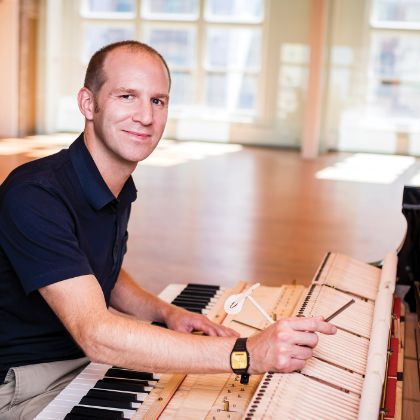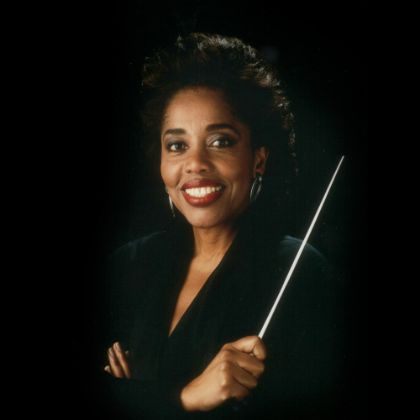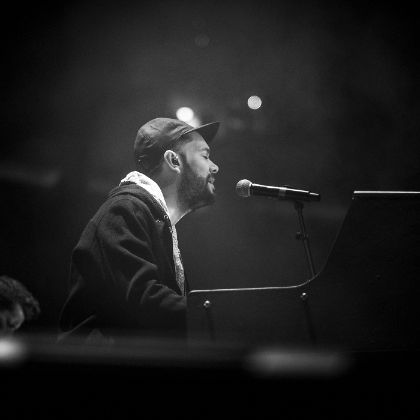Listen Magazine Feature
A piano duo recasts works for voice as instrumental fantasies on a nocturnal theme.
By Bradley Bambarger
Schubert's song "der Erlkönig" is based on a Goethe poem about a child chased and then snuffed out by a bogeyman, a variation on universal nighttime fears. The piano duo Anderson & Roe were attempting to record their virtuosic, fantastical arrangement of the piece when a toddler’s cry wafted through the supposedly empty concert hall of the State University of New York’s Performing Arts Center in Purchase.
The musicians and ever-imperturbable producer Steven Epstein tried to wait it out a bit, but the wails kept on as if the kid could feel the bogeyman closing in. Finally, Epstein left his station to see about rescuing the session, if not the child. Elizabeth Joy Roe, one-half of the piano duo, had another, mischievous idea: “Hey, maybe we should leave it — it’s totally in keeping with the piece, after all!”
Eventually, the child mysteriously disappeared, Epstein returned to the controls, and the Anderson & Roe recording resumed, with “Der Erlkönig” and other works of a nocturnal feel duly documented for When Words Fade: Night Songs for Piano Duo, the sophomore release by Roe and her piano partner, Greg Anderson. The album — presenting the pair’s instrumental versions of vocal pieces down through the ages — is on the label of Steinway & Sons (owned by the parent company of this magazine). Its title takes a cue from Heinrich Heine, the highly quotable 19th-century German poet and journalist, who famously said, “When words leave off, music begins.”
‘We know Bach was a great improviser at the keyboard — as all performers were expected to be in the Baroque.’
This idea — that music can express powerful impressions and emotions when words can’t quite, particularly in the wee-hour realm of obsessions and dreams — drives Anderson & Roe’s set of ingenious arrangements for two pianos and piano four-hands. Along with the Schubert, When Words Fade ranges from Baroque arias (by Vivaldi and Englishman Thomas Arne) and mash-ups of famous operatic numbers (from Mozart’s Magic Flute and Bizet’s Carmen) to amorous vocalise (Rachmaninoff and Villa-Lobos) and songs of moonlight and lovelorn romance (Schumann and Belgian songsmith Jacques Brel). There is even a sequence of disparate contemporary pop and rock tunes: Michael Jackson’s “Billie Jean,” Radiohead’s “Paranoid Android” and Coldplay’s “Viva la Vida.”
“The overarching theme of the record is the psychology of the night — mystery and seduction, dreams and nightmares, darkness both literal and figurative,” explained Anderson. “And the psychology of the lyrics or story resonates in the music even without the words. There can be surprising musical connections between pieces, too. The way we do them, ‘Billie Jean’ and Vivaldi’s aria ‘A Rain of Tears’ have similar textures and are both rhythmically pointillistic. It’s sort of shocking to hear the two and realize how similar they are.
“Then pieces like ‘Der Erlkönig’ and ‘Paranoid Android’ are both sensational, dramatic nightmares, thematically and musically,” Anderson added. “And the Arne aria ‘Glitt’ring Sun’ and Coldplay’s ‘Viva la Vida’ go together in the way they close the album, one being an evocation of the dawn and the other a seize-the-day song.”
To Anderson, the aim of these arrangements is comparable to that of Liszt’s paraphrases of bel canto operas and instrumental treatments of Schubert songs. “The idea is to give the music new life in a fresh setting,” he said. “And the arrangements vary in how liberal they are. The Schubert and Vivaldi are relatively straightforward stylistically, while the four-hands ‘Billie Jean’ is a transformative rearrangement. It sounds less like a pop song and more like a classical piece, with a toccata-like rhythm and more chromatic harmonies.
“We always try to do what the music seems to ask for,” Anderson added. “In the case of Brel, it was the character of his performances — the way he almost spat into the microphone with intensity — that conveyed the art in his music, not his fairly nondescript melodies. So our arrangement of his songs for a concert piece [‘Mathilde, Marieke et Madeleine’] makes the music bigger, trying to capture the spirit of the song rather than keep to the letter.”
Now based in New Haven, Connecticut, Anderson and Roe met in 2000 while freshmen at the Juilliard School. They performed across the country together and recorded the 2008 album Reimagine, gaining a following not only for their traditional concert performances but for their stylishly conceptual (if occasionally hammy) YouTube videos for the “Carmen Fantasy,” Astor Piazzolla’s “Libertango” and Mozart’s Sonata in D major for Two Pianos, among other pieces.
‘The score is just a blueprint, like the blueprint for a room. The blueprint may be perfect, but we still need to adorn the room, decorate it.’
“The videos are designed for a YouTube audience and the fact that the site has so many distractions, with the ads, comments, et cetera,” Anderson said. “We aim for the videos to be eye-catching, so we can hold a viewer’s attention long enough that they become invested in the music.”
Roe added, “But even if it’s just a straight performance, the visual aspect of what we do is like choreography, especially with the very physical arrangements for four-hands. With something like ‘Libertango,’ which we recorded on our first album, what our hands are doing relates to the friction between dancers in the tango. The videos illustrate the appeal of that for people beyond the concert hall.”
The CD of When Words Fade comes with a bonus DVD that features the duo’s self-produced videos for “Billie Jean,” “Carmen Fantasy” and “A Rain of Tears,” as well as a new, professionally produced video by Matthew Brown for “Der Erlkönig” that was shot at the Steinway factory in Queens, New York.
Aside from the child’s errant cries, the recording sessions for the album went smoothly — although there is an inherent challenge to capturing the spontaneous interplay and dynamic interweaving of two pianists while balancing the players’ varying roles of lead and accompaniment. Epstein — a fifteen-time Grammy winner in thirty-three years as a staff producer at Sony Classical — has helmed his share of piano-duo sessions over the decades, for the Labèque Sisters, Yefim Bronfman and Emanuel Ax, even Georg Solti and Murray Perahia on their famed Bartók album. But this was the first piano-duo session for which Epstein worked as producer and engineer simultaneously.
“Because both instruments — in this case, two nine-foot Steinway ‘D’ models — have the same sound, I have to be very conscious of the two parts, piano number one and piano number two, to keep things straight, to make sure everything is there,” Epstein explained. “Also, some of these arrangements are extremely complex harmonically, so what might sound like a wrong note isn’t necessarily. These two players are incredibly virtuosic and wonderfully musical. But I have to be on my toes.”
During the sessions, Roe played from sheet music, while Anderson viewed the music on his iPad, controlling the scroll with a foot pedal. Both pianists are meticulous musicians, which helped Epstein with his task. The duo had time to chat easily with producer and reporter between takes (including talk about how the hit movie Black Swan was filmed in the hall). They each warmed to queries about their partnership process.
“We aren’t similar pianists, really,” Roe said. “But we’re united in our views of music and how to share it with people, as well as our desire to go against the classical status quo. And onstage, we definitely have this chemistry that causes sparks to fly in the best way. Although there isn’t really the opportunity to let go like that in the studio — it’s a more analytical process — we still don’t annotate our scores much. We rely on the adrenaline of the moment and our sense of what excites us.”
Anderson nodded his head in agreement when Roe suggested that their friendship is the most important ingredient in their partnership. He said, laughing: “And when the friendship goes, the duo goes.”
Roe added, “We are the rare piano duo that isn’t related or married. But that just means we fight less than the others.”
Dynamic Duo
 Recordings of piano duos may be considered left-field, but they needn’t be strictly for connoisseurs. The original repertoire for the medium includes alluring works by Schubert and Rachmaninoff. Then there are ear-opening arrangements from the days before records, with the piano-duo version of Stravinsky’s Rite of Spring able to make the piece sound even more modernist than the famous orchestration.
Recordings of piano duos may be considered left-field, but they needn’t be strictly for connoisseurs. The original repertoire for the medium includes alluring works by Schubert and Rachmaninoff. Then there are ear-opening arrangements from the days before records, with the piano-duo version of Stravinsky’s Rite of Spring able to make the piece sound even more modernist than the famous orchestration.
With the album When Words Fade (Steinway & Sons), Anderson & Roe offer a kaleidoscopic and very contemporary take on how appealing a piano duo can be, as they range from the Baroque to avant-rock. A highlight is their reimagining of Vivaldi’s aria “Sento in seno ch’in pioggia di lagrime” (“I feel within a rain of tears”). One piano is prepared with dampened strings so that its sound approximates the pizzicato of strings and the patter of raindrops; the other piano unfurls a tender melody through that metaphoric veil.
At the other end of the dynamic spectrum is Anderson & Roe’s arrangement of Radiohead’s “Paranoid Android,” a dizzying, suite-like epic from the English band’s 1997 landmark album, OK Computer. The song has inspired wildly divergent cover versions, topped by jazz pianist Brad Mehldau’s improv-stoked solo interpretations. Anderson & Roe compel by virtue of the symphonic grandeur and lyrical subtlety of tandem pianos, richly recorded. The duo’s nine-minute fantasia hints at the unhinged qualities of the original even as it underscores the song’s almost operatic beauty. — Bradley Bambarger
This article originally appeared in Listen: Life with Music & Culture, Steinway & Sons’ award-winning magazine.
related...
-

A Calming Presence
The curious life of concert technician Joel Bernache.
Read More -

Tania León — ‘Where Are You In This Music?’
The Pulitzer Prize–winning composer and Steinway Artist Tania León speaks to her identity as a global citizen.
Read More -

Ben Lovett - The Outsider's Insider
Mumford & Sons’ Ben Lovett on New York City as creative
inspiration, working within and without the industry, his musical journey, and songwriting.by Ben Finane
Read More